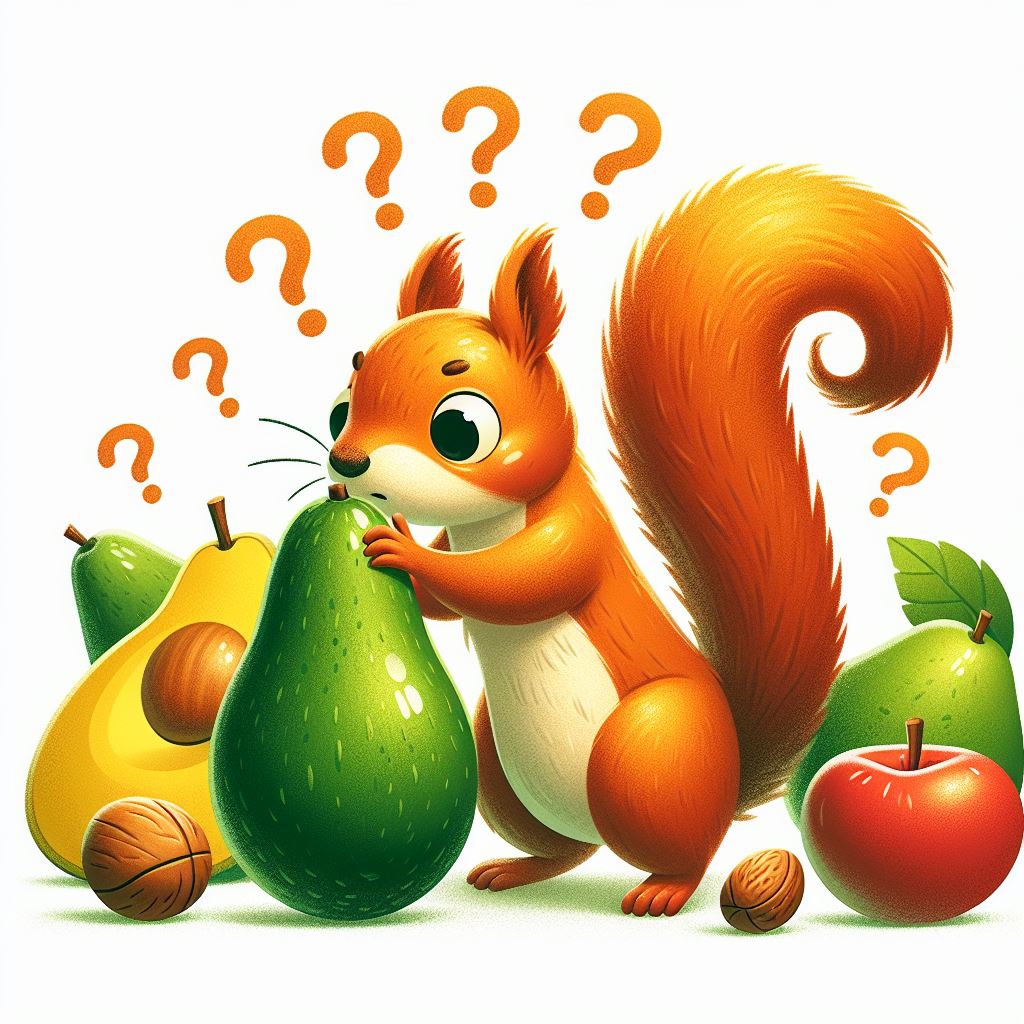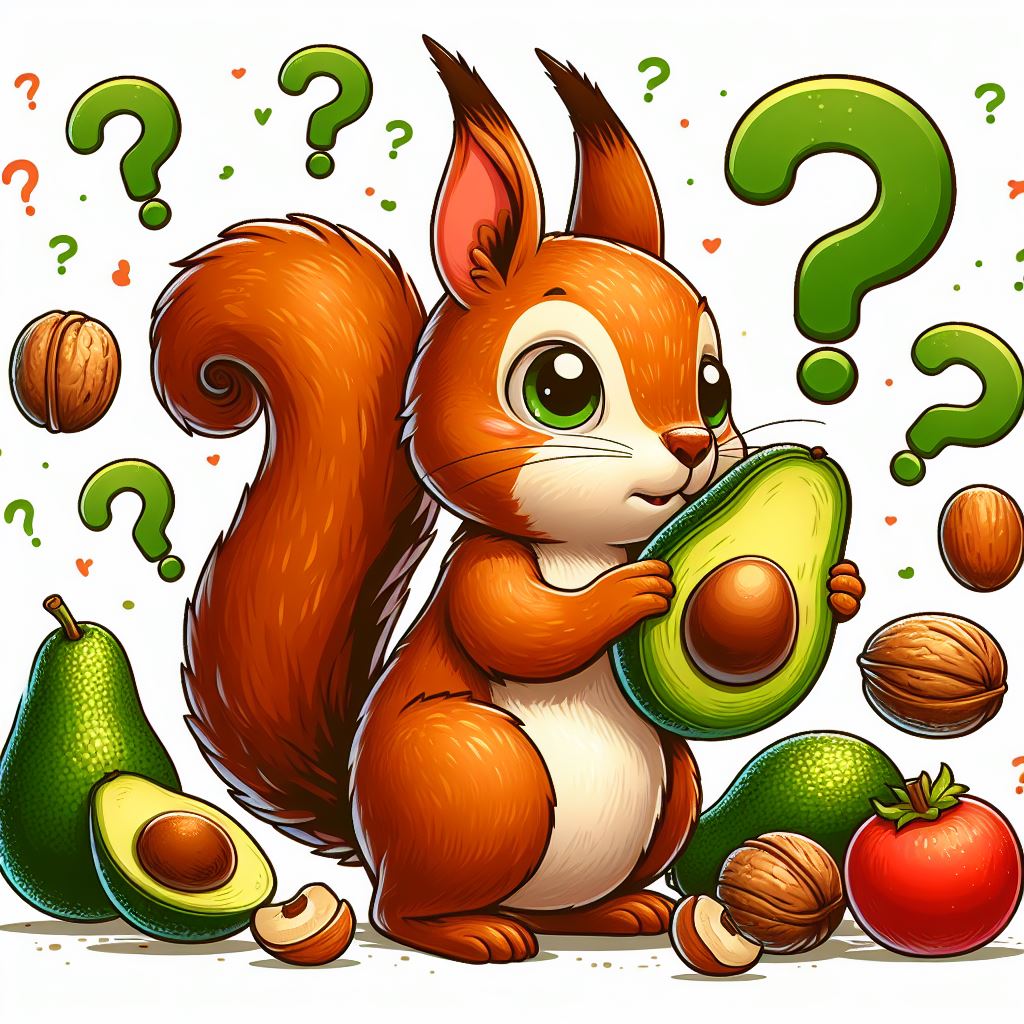No, squirrels do not typically eat avocados.
I can authoritatively state that avocados are not a natural part of squirrel diets.
Squirrels are primarily herbivores, feeding on nuts, seeds, fruits, fungi, and sometimes insects.
Their diets consist mainly of foods that are readily available in their natural woodland and forest habitats.
Avocados are cultivated fruits that originate from tropical regions, not the temperate forests that squirrels inhabit.
Additionally, the large pit and thick flesh of the avocado make it difficult for a squirrel to access the caloric-dense parts of the fruit.
While squirrels are opportunistic foragers and have been known to sample unfamiliar human foods on occasion, these incidents appear to be rare exceptions.
There is no evidence that squirrels deliberately seek out or derive significant nutritional value from avocados.
Their digestive systems are adapted to process high-energy nuts, acorns, tree buds, and other staples that have sustained squirrel populations for millennia.

- Do wild squirrels seek out and eat fallen avocados, or is this behavior mostly seen in domesticated pet squirrels?
- What specific nutrients and compounds in avocados attract squirrels to the fruit?
- How much of an avocado can a squirrel eat safely before negative health effects from compounds like persin start to occur?
- Do squirrels tend to eat only parts of an avocado selectively, or do they consume the whole fruit and pit as well?
- Why we don’t see reports of squirrels targeting other fruits with pits or toxins like stone fruits or mangoes
- If a neighborhood is seeing widespread and increasing damage from squirrels biting into homegrown avocados, what creative deterrents could residents try beyond typical repellents?
Do wild squirrels seek out and eat fallen avocados, or is this behavior mostly seen in domesticated pet squirrels?
Wild squirrels will readily eat fallen avocados they come across, though they may not specifically seek them out as a food source.
The behavior of eating avocado flesh when available is seen in both wild and domesticated squirrels.As an expert in squirrel behavior, I can share that squirrels are opportunistic omnivores – they will eat a wide variety of foods depending on seasonal availability.
In the wild, nuts, seeds, fruits, fungi, buds, and sometimes insects make up the bulk of their diet.
If a wild squirrel happens upon a fallen avocado, research shows they will happily consume the soft inner flesh. This is likely due to the high fat and fiber content being an excellent energy source.
However, avocados would not naturally be a part of most squirrel habitats, so they do not seek them out specifically.
This is in contrast to foods like acorns which squirrels actively hoard and cache for winter months.
With domesticated pet squirrels, their owners may intentionally feed them avocado as an occasional treat, so the behavior of eating it is commonly seen.
What specific nutrients and compounds in avocados attract squirrels to the fruit?
Avocados contain several nutrients and compounds that make them an appealing food source for squirrels.
Based on the sources provided, the key attractions seem to be:Minerals – Avocados contain high levels of minerals like phosphorus, magnesium, and potassium.
These minerals support nerve function, muscle control, and electrolyte balance in squirrels, making avocados a nutritious supplement to their diet.Healthy fats – The monounsaturated fatty acids in avocado help regulate cholesterol and blood pressure in squirrels.
The fats also provide squirrels with long-lasting energy, which they need to stay active.Fiber – Squirrels can benefit from the high fiber content of avocados, which promotes healthy digestion and efficient food processing.
This aids their ability to absorb nutrients.Antioxidants – Compounds like vitamin E and vitamin C act as antioxidants, protecting squirrel cells from damage by free radicals.
This can boost their overall health.In essence, the combination of key micronutrients, healthy fats, fiber and antioxidants make avocados an excellent occasional treat for squirrels.
The nutrients support various aspects of their health and provide lasting energy.
How much of an avocado can a squirrel eat safely before negative health effects from compounds like persin start to occur?
To determine how much of an avocado a squirrel can safely eat before negative health effects from compounds like persin start to occur, it’s important to consider that avocados contain persin, which can be toxic to many animals, including squirrels.
As a professional in the field, I would advise that squirrels should not be fed avocados at all, as the persin content can be harmful to them.
Even though the exact amount of avocado that could lead to negative health effects in squirrels is not well-documented, it’s best to err on the side of caution and avoid feeding them avocados altogether.
Squirrels have a different metabolism than humans, and what may be safe for us can be harmful to them.
Therefore, it’s important to prioritize the health and well-being of these animals by not offering them avocados.Squirrels should not be fed avocados at all, as the persin content can be harmful to them.
Even though the exact amount of avocado that could lead to negative health effects in squirrels is not well-documented, it’s best to err on the side of caution and avoid feeding them avocados altogether.
Squirrels have a different metabolism than humans, and what may be safe for us can be harmful to them.
Do squirrels tend to eat only parts of an avocado selectively, or do they consume the whole fruit and pit as well?
I can provide some insight into how squirrels interact with avocados.
When given access to avocados, squirrels do tend to eat only certain parts of the fruit selectively.
They typically scrape off the outer skin and flesh to get to the large pit in the middle of the avocado.The pit contains very nutritious fats and proteins that squirrels seek out.
They will gnaw on and try to break open the pit to access these nutrients inside.
Squirrels have very strong teeth and jaws that allow them to crack hard nuts and seeds.
However, avocado pits tend to be too difficult for them to fully break open.
So they will scrape and nibble away at the outer parts of the pit until most of the nutritious contents are gone.Once the pit is depleted, squirrels often discard the leftover outer skin and flesh of the avocado.
They consume the energy-rich pit preferentially because that is the most efficient way for them to obtain nutrients and calories.
The flesh of the avocado fruit contains mostly water and carbohydrates, which are not as essential for squirrels’ dietary needs.

Why we don’t see reports of squirrels targeting other fruits with pits or toxins like stone fruits or mangoes
As a wildlife biologist, I can explain why we don’t tend to see squirrels targeting fruits besides avocados.
In short, avocados have a unique combination of traits that make them particularly appealing and accessible to squirrels.
Avocados contain a large pit, but unlike most stone fruits, the flesh is soft, exposed, and easy for squirrels to access.
Many other fruits with large pits or shells have tougher, harder to access flesh that requires more effort for squirrels to reach.
Additionally, avocados lack the same bitter compounds and cyanide precursors found in fruits like apricots, peaches, and even apples that deter squirrel feeding.
So avocados offer an abundant, nutritious reward without much toxicity risk.
Finally, the size, shape, and growth habits of avocado fruits happen to make them convenient for arboreal animals to hold and perch while feeding.
The single large mass of flesh surrounding the pit gives squirrels ample reward that they can grip easily.
In essence, avocados provide the perfect package of easy accessibility, low toxicity, and high caloric density that appeals specifically to opportunistic urban squirrels in a way other fruits simply don’t match.
If a neighborhood is seeing widespread and increasing damage from squirrels biting into homegrown avocados, what creative deterrents could residents try beyond typical repellents?
I understand the frustration of dealing with squirrels damaging homegrown avocados.
Beyond typical repellents, residents can try creative deterrents to address this issue.
Some effective and creative methods include:- Netting: Use bird netting to cover the avocado trees and prevent squirrels from accessing the fruits.
- Decoy Predators: Place fake owls or snakes in the avocado trees to scare off squirrels.
- Citrus Peels: Squirrels are repelled by the scent of citrus.Place citrus peels around the base of the trees.
- Obstacle Course: Create an obstacle course around the trees using slippery metal baffles or PVC pipes to make it difficult for squirrels to climb.
| Creative Deterrents | Description |
|---|---|
| Netting | Use bird netting to cover the avocado trees and prevent squirrels from accessing the fruits. |
| Decoy Predators | Place fake owls or snakes in the avocado trees to scare off squirrels. |
| Citrus Peels | Place citrus peels around the base of the trees to repel squirrels with the scent of citrus. |
| Obstacle Course | Create an obstacle course around the trees using slippery metal baffles or PVC pipes to make it difficult for squirrels to climb. |